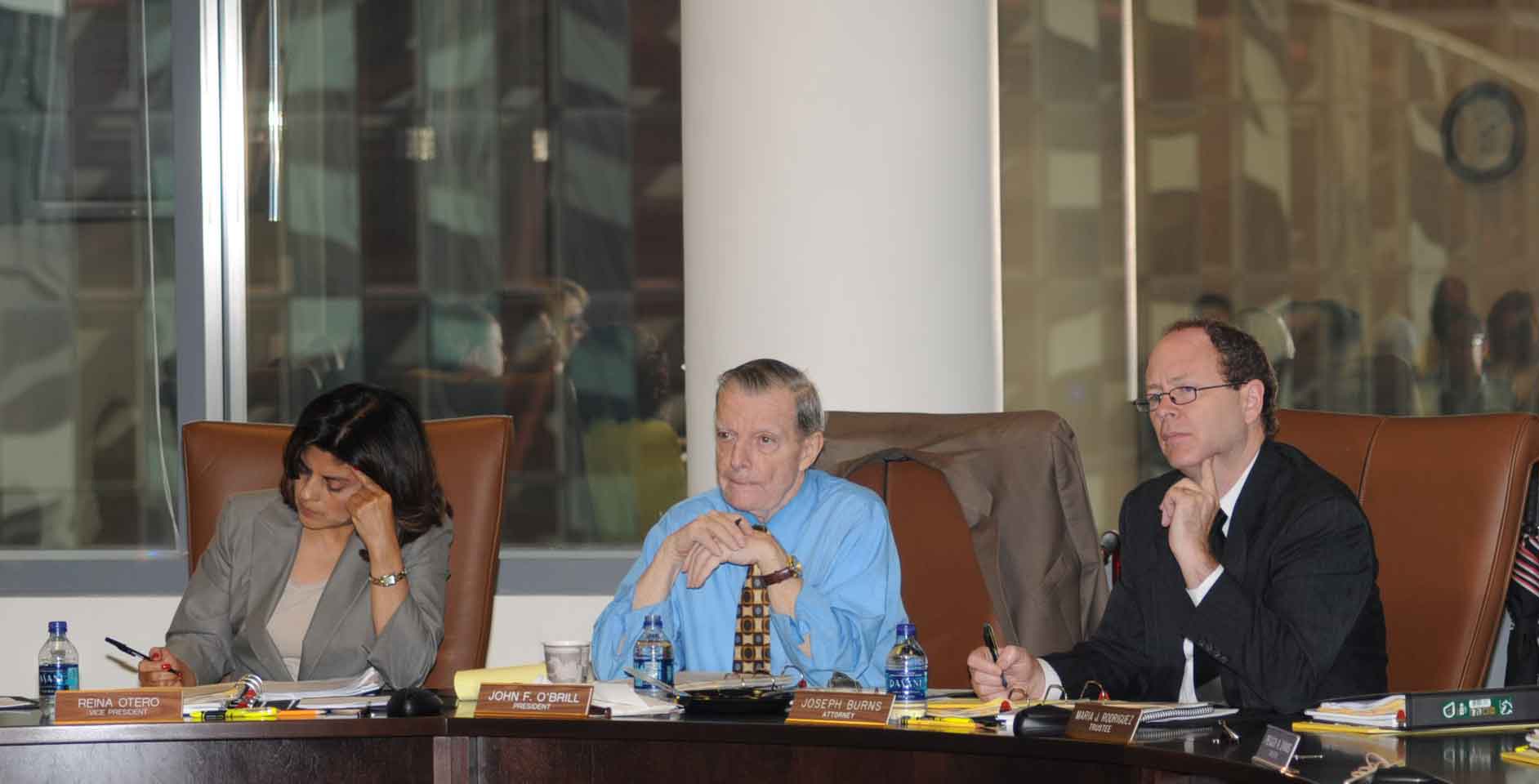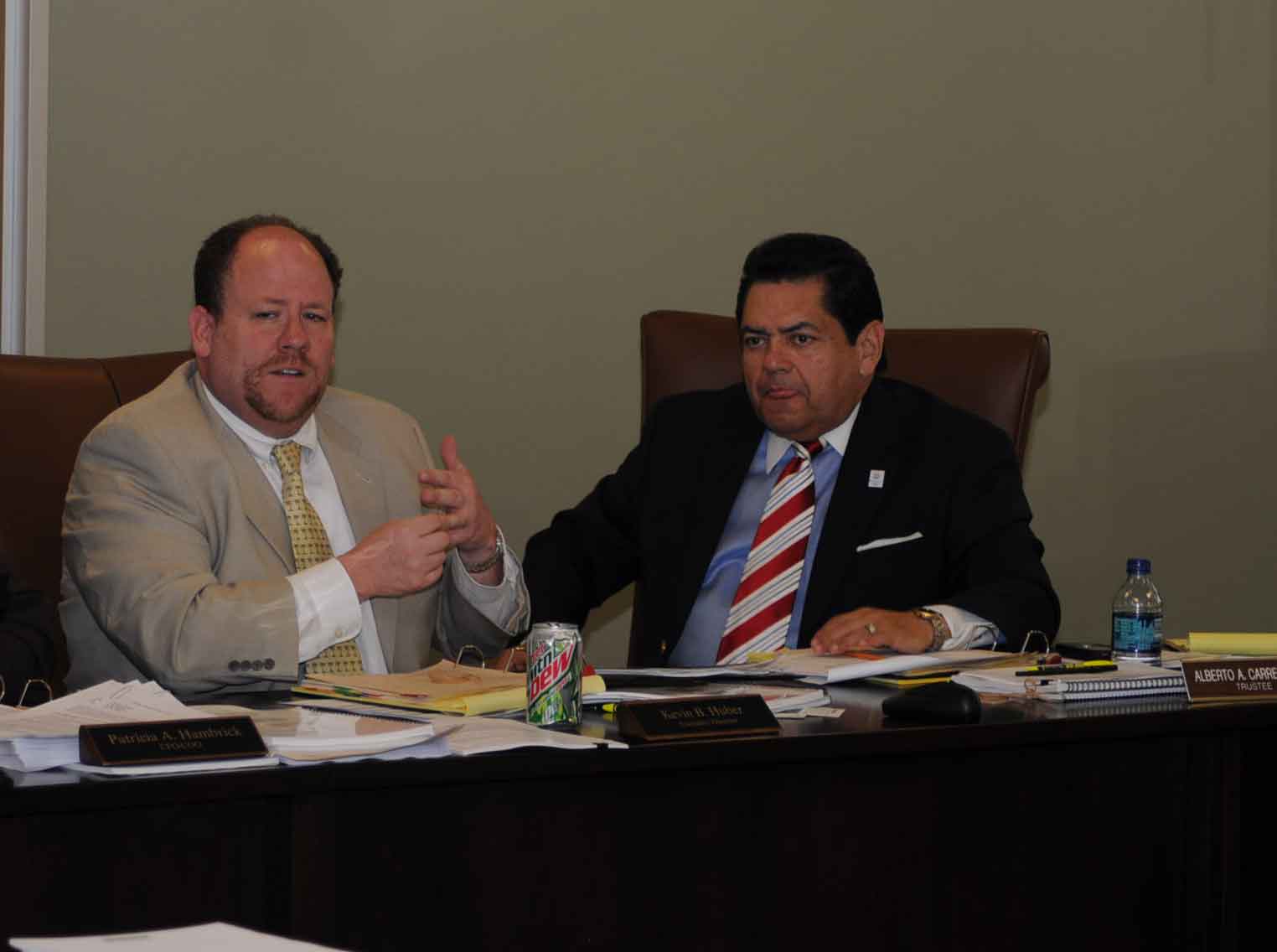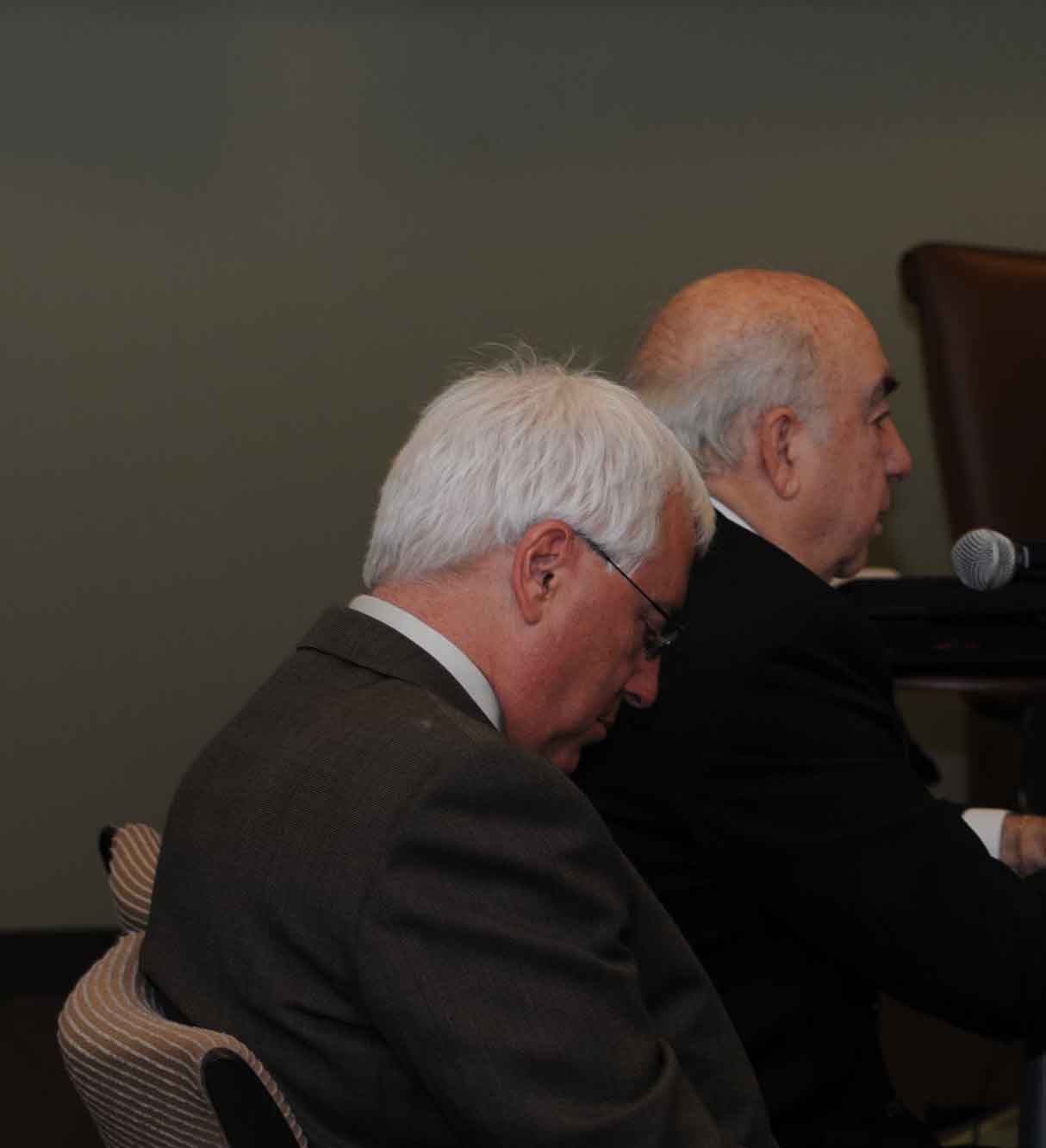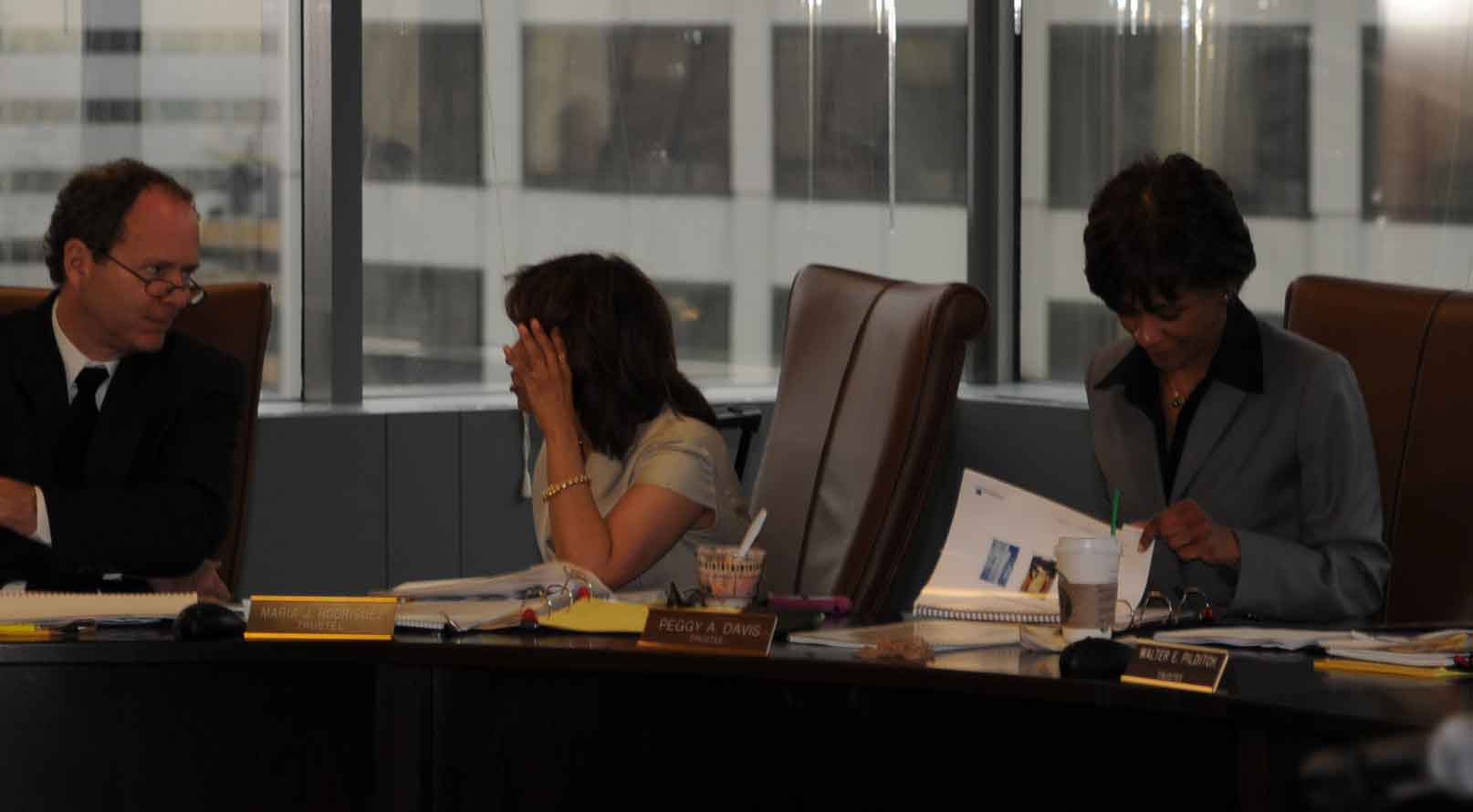Bond ratings agencies join CPS attack on pension fund... Fitch ignores reserves, escalation of 'services' costs to target pension costs and promote CPS demand for 'pension holiday'
While the Chicago Teachers Pension Fund trustees were meeting on June 16, 2009, at the Fund's LaSalle St. headquarters, the Fund's lobbyists in Springfield were fending off another attack by the Chicago Board of Education on the Fund. But the open politics was just one thing. Behind the scenes, one of the nation's most important financial institutions, Fitch Ratings, was slanting its analysis of CPS finanances to add to the chorus against the continued obligation the Chicago Board of Education has to the 100-year-old Chicago Teachers Pension Fund (CTPF) and the tens of thousands of teachers, present and retired, who are part of the fund.
Fitch spins some 'data'?
The official agenda for the June 24. 2009, meeting of the Chicago Board of Education won't become public until roughly 10:00 a.m. on Monday June 22. Although a summary agenda is available to the public, that agenda, usually three or four pages in length, gives no real information about the content of the Board's agenda. The complete agenda for the June 24 meeting will run to between 100 and 200 pages and will include more than 50 "Board Reports", each of which will detail some important action the Board will vote to take affecting the lives of the city's 400,000 public school students, their teachers, their families, and the taxpayers of Chicago.
 Chicago Teachers Pension Fund (CCTPF) President John O"Brill (center) listens to reports during the June 16, 2009, meeting of the Fund. Left above is Pension Fund Vice President Reina Otero. Right above is Fund attorney Joseph Burns. Thue Fund's agenda for its lengthy June 2009 meeting included a great deal of information about the performance of investments in the challenging financial situations currenltly facing investors. There was an equally lengthy report from Springfield Illinois, where the Chicago Board of Education continues to lobby for a "pension holiday" to reneg on its obligations to make promised contributions to the CTPF. Not mentioned during the meeting was that the Chicago Board of Education had slanted its budget presentations to the bond rating agencies to effectively enlist their support for the Board's attack on Chicago teacher pensions. Substance photo by George N. Schmidt. A week before the Board met, an obscure Web site made it clear that one of the major items on the CPS agenda for June 24 will be the refinancing of hundreds of millions of dollars on Chicago Board of Education bonds.
Chicago Teachers Pension Fund (CCTPF) President John O"Brill (center) listens to reports during the June 16, 2009, meeting of the Fund. Left above is Pension Fund Vice President Reina Otero. Right above is Fund attorney Joseph Burns. Thue Fund's agenda for its lengthy June 2009 meeting included a great deal of information about the performance of investments in the challenging financial situations currenltly facing investors. There was an equally lengthy report from Springfield Illinois, where the Chicago Board of Education continues to lobby for a "pension holiday" to reneg on its obligations to make promised contributions to the CTPF. Not mentioned during the meeting was that the Chicago Board of Education had slanted its budget presentations to the bond rating agencies to effectively enlist their support for the Board's attack on Chicago teacher pensions. Substance photo by George N. Schmidt. A week before the Board met, an obscure Web site made it clear that one of the major items on the CPS agenda for June 24 will be the refinancing of hundreds of millions of dollars on Chicago Board of Education bonds.
The role of the bond rating agencies
In order for the bonds to be sold in the complex bond market, the three ratings agencies (Moody's, Standards and Poors, and Fitch) have to give the bonds a "rating." The higher the rating, the lower the interest to the Board when it borrows money in the bond markets.
The bond rating agencies once toiled in obscurity, but since the collapse of the world financial system they have become more prominent. As a result of the collapse of the so-called "sub prime" mortgage market and the devaluation of many complex financial instruments that were also rated by the same agencies (often, at A+ and above ratings until the housing markets collapsed, not only in the USA but across most of the world), the rating agencies have come under more and more scrutiny.
Careful scrutiny has not extended, apparently, to when those agencies are rating Chicago Board of Education debt.
Target: The 'Board's' Pension Fund
An examination of the most recent narrative on CPS bonds by Fitch ratings [one of the three agencies that will be rating the debt to be offered next week by CPS] shows that Fitch ignores some of the more complicated aspects of CPS finances, especially expenses caused by quasi-privatization activities such as charter schools, or the huge difference between the Board's annual 'deficit' claims and the subsequent revelations that the Board increases its reserve fund each year.
 Chicago Teachers Pension Fund Director Kevin Huber (above left) and Trustee Alberto Carrero (above right) listen to one of the presentations at the Fund's meeting of June 16, 2009. Carrero is one of two Chicago Board of Education members who sit on the CTPF Board of Trustees. Substance photo by George N. Schmidt.Instead, Fitch chooses to target the same target — CPS contributions to the pension fund — that has been singled out for attack by the Chicago Board of Education since July 2008.
Chicago Teachers Pension Fund Director Kevin Huber (above left) and Trustee Alberto Carrero (above right) listen to one of the presentations at the Fund's meeting of June 16, 2009. Carrero is one of two Chicago Board of Education members who sit on the CTPF Board of Trustees. Substance photo by George N. Schmidt.Instead, Fitch chooses to target the same target — CPS contributions to the pension fund — that has been singled out for attack by the Chicago Board of Education since July 2008.
In July and August 2008, Arne Duncan's financial staff presented the proposed FY 2009 (2008-2009 school year) budget to the public at three hearings. CPS officials ignored the large increase in CPS reserves and surpluses — and an enormous increase in "contractual and other services" (mostly the result of quasi-privatization through charter schools).
Instead, CPS financial officials singled out the teachers' pension fund as the source of future budget woes for Chicago's public schools.
 Pension Fund lobbyists (above) reported on the struggles in Springfield, where Governor Quinn and the Illinois General Assembly are still at odds over pension legislation. Substance photo by George N. Schmidt.A year later, the bond agencies began to repeat the same narrative; ignoring other complex political and economic factors and focusing with CPS and some Chicago media and politicians on the alleged growth in the cost of the pension obligations of Chicago. While the bond rating agencies do not join CPS in calling from what has been termed a "pension holiday," by slanting their ratings and targeting the pension obligations, they might as well be.
Pension Fund lobbyists (above) reported on the struggles in Springfield, where Governor Quinn and the Illinois General Assembly are still at odds over pension legislation. Substance photo by George N. Schmidt.A year later, the bond agencies began to repeat the same narrative; ignoring other complex political and economic factors and focusing with CPS and some Chicago media and politicians on the alleged growth in the cost of the pension obligations of Chicago. While the bond rating agencies do not join CPS in calling from what has been termed a "pension holiday," by slanting their ratings and targeting the pension obligations, they might as well be.
But let's take a careful look at how Fitch presents its information on the upcoming CPS bond offerings: "Fitch Rates Chicago Board of Education, Illinois' $95.7MM GOs 'A+ ...," the Fitch release said. According to Ficth, "Approximately $75.4 million series 2009B;--Approximately $20.3 million series 2009C.The bonds are scheduled for negotiated sale on or about June 24, 2009 [immediately following the Chicago Board of Education meeting]... Fitch also rated additional bonds to be offered after the Board vote next Wednesday.
According to Fitch: "The [CPS] Rating Outlook remains Positive. The bonds are alternate bonds payable from pledged general state aid revenues, and if insufficient, from unlimited ad valorem taxes levied against all taxable property in the City of Chicago. Pledged revenues are expected to provide not less than 1.1 times debt service coverage. Proceeds will refinance outstanding variable rate debt, formerly supported by a liquidity facility; the current issuance will be variable rate debt, fully supported by a letter of credit..."
For those who have been listening to the gloom and doom of reports in the Chicago Tribune (and extensive quotes from Mayor Richard M. Daley), the Fitch assessment of CPS might come as a surprise: "The Positive Outlook is based on an improved financial position and augmented reserve levels; demonstrated support from senior governments for both operations and the board's capital plan; and enhanced educational programs which have contributed to student achievement," Fitch reports.
"Fitch expects the board will continue to face budgetary strain from increased pension payments and other personnel benefit costs," [emphasis ours] the report goes on.
The report then goes on to discuss the current fiscal year (FY 2009, which ends June 30, 2009) before going on to FY 2010 (which ends June 30, 2010). "Fiscal 2009 is likely to produce a shortfall, although less than originally budgeted due to spending cuts, including staffing reductions, and additional revenue from federal and local sources," Fitch continues. "Fiscal 2010 will require further budget cuts as pension payments balloon further, [again, emphasis outs] though federal stimulus funds will help offset the need for program adjustments..."
After singling out the pension obligations twice, Fitch then becomes vague about other things facing CPS. "Maintenance of adequate fiscal reserves, despite spending pressure and the financial effects of a weakened economy, is a key credit consideration," Fitch reports. "The city of Chicago's tax expanded at a rapid 10% average annual rate since 2003. Both the tax and employment bases are diverse, and the city is the economic engine of the state." In other words, both increased taxes during the past six years and the ability of CPS to generate a large reserve fund makes it still worthwhile to invest in CPS bonds. A major problem, if Fitch is to be believed, is that "pension obligation."
Of course, there are others: "Nonetheless, like many large urban areas, Chicago has significant subprime mortgage exposure and foreclosure rates are well above the national average. As the area has experienced job losses particularly in financial services and construction-related employment, the city's unemployment rate increased to a high 10.6% in April 2009. The Chicago Public School's financial position has improved in the past several years through strong budgetary management and continued tax base expansion with modest property tax increases..."
Near the bottom of the Fitch assessment is a revelation that proves several years of Substance critiques of the way in which the CPS budget staff presents the school system's annual budget during the summer.
"In fiscal 2008," Fitch reports, "the unreserved general fund balance improved to $432.4 million, or 9.8% of spending, compared to $307.7 million in fiscal 2006..."
 Above, CTPF attorney Joseph Burns in discussion with Teacher Trustee Maria Rodriguez, who works as a Field Rep for the Chicago Teachers Union. To the left of Rodriguez is Peggy Davis, the second Trustee who represents the Chicago Board of Education. During the meeting, Rodriguez repeatedly covered her face when Substance was photographing the meeting. Substance photo by George N. Schmidt."While the board recognized a sizeable $194 million surplus, the board revised the revenue recognition period from 90 days to a more conservative 30 days, resulting in an accounting adjustment of $159 million," Fitch continues. "In fiscal 2009, the general fund is likely to produce a modest shortfall, although it is expected to be less than the $100 million originally expected..."
Above, CTPF attorney Joseph Burns in discussion with Teacher Trustee Maria Rodriguez, who works as a Field Rep for the Chicago Teachers Union. To the left of Rodriguez is Peggy Davis, the second Trustee who represents the Chicago Board of Education. During the meeting, Rodriguez repeatedly covered her face when Substance was photographing the meeting. Substance photo by George N. Schmidt."While the board recognized a sizeable $194 million surplus, the board revised the revenue recognition period from 90 days to a more conservative 30 days, resulting in an accounting adjustment of $159 million," Fitch continues. "In fiscal 2009, the general fund is likely to produce a modest shortfall, although it is expected to be less than the $100 million originally expected..."
While ignoring the facts, including the fact that the predicted "deficit" each year has produced a surplus at the end of each year for the past four or five years, Fitch returns to its hammering of the pension obligation. "Fiscal 2010 will be a difficult year for CPS, as pension payments have increased more than tenfold since 2006 and teacher contracts, though settled through 2012, provide somewhat generous wage increases of 4% annually" it continues. "Fitch anticipates that CPS will again adjust staffing levels as well as seek efficiencies in other areas of spending. Management plans to use stimulus funds to help maintain existing special education, bilingual, and preschool programs..."
Fitch doesn't even recognize the fact that the Chicago Teachers Pension Fund is not the "Board's" fund, but an independent entity: "The board's pension system was 80% funded as of June 30, 2008, but Fitch expects a significant drop in the funding ratio due to investment losses in the current fiscal year. The board adopted GASB 45 two years early, and its total liability to the Health Insurance Program for retiree health care is a significant $2.1 billion as of June 30, 2008. Fitch's rating definitions and the terms of use of such ratings are available on the agency's public site, Published ratings, criteria and methodologies are available from this site, at all times..."
Partly as a result of the scandals that have involved the rating agencies during the past two years, the following ends each of the Fitch reports: "Fitch's code of conduct, confidentiality, conflicts of interest, affiliate firewall, compliance and other relevant policies and procedures are also available from the 'Code of Conduct' section of this site..."

